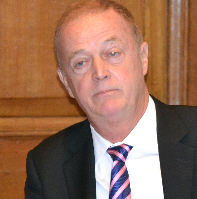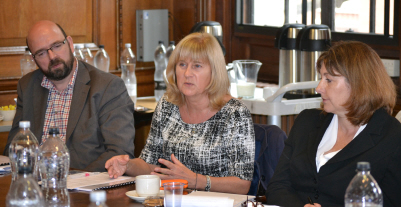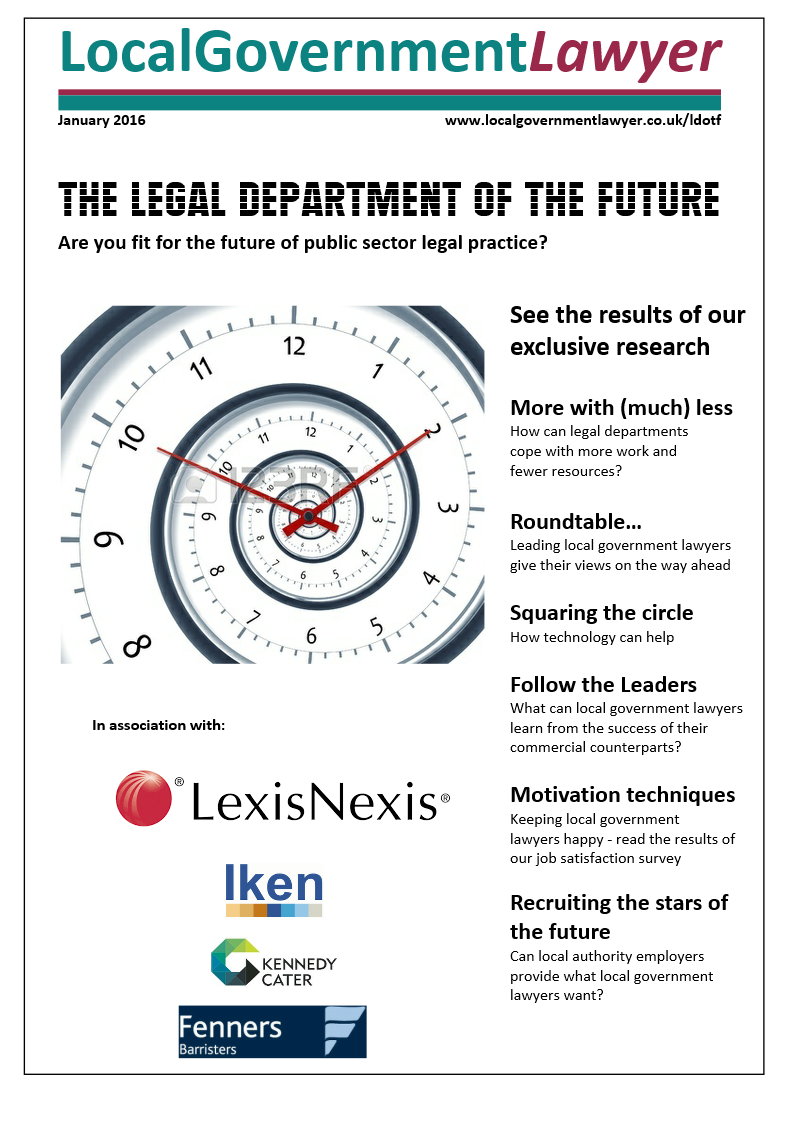The way ahead

The Legal Department of the Future survey highlights some serious challenges for legal departments, their staff and clients. Local Government Lawyer convened a roundtable of legal services leaders to identify how some of these issues can be addressed. Derek Bedlow reports.
The Legal Department of the Future survey paints a picture of ever-rising demand for local authority legal services but static or diminishing resources being made available to deal with it. While, according to Law Society figures, the number of solicitors employed in local government in England and Wales has remain largely unchanged over the past five years (compared with the drop of 21% in overall local government employment between 2010 and 2015 identified by the ONS), demand for legal services is still outstripping supply.
Moreover, demand is expected to keep growing. Forty-four per cent of the 100 heads of legal that took part in the survey expected to see a “significant” increase (more than 10%) in legal work in the foreseeable future and a further 37% anticipated an increase of at least 5%.
Despite this, only 34% of respondents expected to increase the number of lawyers they employ and close to the same proportion (31%) expected the numbers of lawyers in their teams to shrink. At the same time, the majority of respondents (54%) expected the budget available for external legal services to shrink, compared with just 8% that predicted a rise.
The top concern unsurprisingly for heads of legal that took part in the survey was cost control – included in the top three challenges by 69% of respondents – and more than a quarter said that defending the department from cutbacks remained one of their key challenges, five years on from the Comprehensive Spending Review that introduced the swingeing cuts that local government has endured.
As one delegate told the roundtable, the traditional approach to the allocation of resources in local government is disadvantaging legal teams in the post-austerity environment: “I’ve come to the conclusion that local government suffers now from ‘budget management’. It’s done it for years and it’s worked very well but across all councils now, the only thing you have is reduction. Managers are just confined by their budgets which they have to reduce, usually by reducing staff and output.
“But we can’t reduce output once we’ve taken the work on. We risk breaching our duties to the court and we risk our responsibilities to the SRA. Once we’ve taken work on, we need to do it.”
So the key question for the delegates at the roundtable was this: what can be done by local authority legal departments to square the circle of falling revenue and rising workloads?
Empowering the client
Internally, many authorities are working more closely with clients to forecast future workflows and to enable client departments to do more of it themselves, reducing their reliance on the legal department. However, the roundtable delegates generally agreed that there remains much to be done in this respect and that managing client demand is a growing problem as more senior members of staff have left or retired because of budget cuts. The growing lack of experience in client departments was identified as one of three biggest challenges by more than a third (36%) of survey respondents.
At Essex Legal Services, Assistant Director – Law and Operations Angela Hutchings detailed her department’s comprehensive programme to empower clients to take decisions for themselves where possible. This consists of a number of initiatives, including the production of articles, how-to guides and FAQs by in-house lawyers, providing training and ‘legal surgeries’ within client departments and a ‘phone a friend’ facility for clients.
“Where you’re seeing senior officers in the business who are leaving or retiring and younger people coming through, who don’t have the same experience, that corporate memory is being lost and so we’re trying to rebuild it.” she said, before adding that this not an overnight task. “It is a lot of effort and it can feel like one-way traffic at times, but it does eventually gain traction. You just have to stick with it,” she said.
Delegates reported that empowering clients to take their own decisions is particularly difficult with child protection work. At Southwark, Director of Law and Democracy Doreen Forrester-Brown said that her department had had some success in reducing the number of child protection cases from 120 a year to around 45 through helping to improve the governance regime within the Children’s Services team.

“If work continues to increase by 5%-10% each year, I can justify further recruitment but without the data it can be a real battle to persuade people that we need more resource.” David Tatlow, |
She said: “A lot of that was around making sure that children’s services put in place proper governance networks. And we advise them what their structures might be in order for decisions to be made safely, but also to be clear about where the risk is being managed. What we’ve found is that our work has changed from having lots and lots of cases in court to actually managing it through the Public Law Outline. Once it’s outside of the court process the departments are managing quite a lot of risk. So while you need to be careful, it is about getting that governance right and pushing that responsibility back onto the clients.”
The knowledge gap
Internal efficiency is also being driven by the adoption of legal technology although, again, there is still some distance to travel before the benefits are being fully realised across the local government legal sector.
Paul Evans, Assistant Director of Corporate Governance and head of the South London Legal Partnership – the shared legal service of the London boroughs of Merton, Kingston-upon-Thames, Richmond-upon-Thames and Sutton – estimated that councils across London could save more than £1m through moving to paperless working alone, but progress in adopting the latest legal technology has not been helped by budget cutbacks and the more general slowdown in investment in authority-wide IT systems.
|
Attendees ● Derek Bedlow, Publisher, Local Government Lawyer |
Tanya Corsie, Director and Chief Operating Officer at legal IT supplier Iken, told the roundtable that the situation was changing rapidly in response to some of the needs identified by the survey.
“I’ve found that increasingly people are trying to interact much more with their clients, sharing workflows and enabling their clients to access self-service information, so we have been doing a lot of work around client intranets and online communication. This can create issues around data security and ensuring that sensitive information is only shared with those that are authorised to see it, but good systems will have safeguards built in.
“I think a lot of technology companies tend to consider local government conservative with regards to some of their technology needs, but there is a real desire to work smarter now and it’s a really exciting time to be working with local government teams.”
The sector was also a late adopter of workflow management systems compared with private practice – not least because some lawyers joined local government with the aim of avoiding time recording – but this is changing rapidly as the need for legal departments to demonstrate their value through metrics has become increasingly important. “We need data to back up our assertions, not just our professional judgement, if we are not just to be seen as a cost at a time when work is rising between 5% and 10% year-on-year,” said David Tatlow, Director of Legal and Democratic Services at Birmingham City Council.
“What I have done is to identify the number of work types that we’ve got, which at Birmingham is 180. We then give an indicative time, a target for each one. As we know the volume of work for each of the 180 work types, we multiply that volume by the indicative time that it’s going to take to complete that particular type of work. And you come up with a total number of hours that you need for the year. If you do that for all work types, you have the total number of hours that you need for each time and for the whole of Legal Services. And if you divide that by the chargeable hours target you have per person, somewhere around 1,400, I need 160 staff. And if work continues to increase by 5%-10% each year, I can justify further recruitment but without the data it can be a real battle to persuade people that we need more resource.”
This kind of management information is also increasingly important for the efficient management of internal workflows, to enable heads of legal to predict, as far as possible, where work is likely to arise and to be able to resource it efficiently.
In doing so, it was suggested, legal departments might also be able to reverse the decline in status they have suffered in recent years. “We need to be a lot smarter about this,” one delegate said. “Rather than just providing everything, we need to focus on doing the things that we can do really well, and trying to ensure that the run-of-the-mill work can be done by the client or at an appropriate level. That’s what members and chief officers are looking for - good quality advice that helps them achieve what they want to do and that will enhance the role of the legal department.”
At Southwark, a further internal solution to cost pressures is the development and recruitment of a number of specialist lawyers to the team, in an effort to reduce its reliance on private practice in key areas and to enhance the visibility of the legal team in high-profile transactions. The council currently has two specialising in contracts and procurement and one in litigation with another planned for adult social care.
Although the pay scales for specialist lawyers are similar to those of team leaders, they do not have managerial responsibilities, freeing them up to concentrate on their practice-focused roles. Again, Forrester-Brown said, while the creation of specialist roles required some tough negotiating with HR, backed up by data derived from the automation of many of the department’s processes, and that creating specialist roles within existing local authority pay structures would continue to be challenging, it is worth the effort.

“My legal department can be working with a series of models that helps us to deliver an efficient and effective legal service. There may be other creative options that we’ve still not really explored, in part because we have spent so much time exploring the ABS model.” Doreen Forrester-Brown |
What is more, the development of specialist practitioners also has the potential to address some of the career development issues identified by respondents to the Local Government Lawyer careers survey, which threaten to undermine the drive for greater efficiency and quality within in-house teams. Budget cuts, ‘delayering’ and the growth of shared legal services mean that the number of management roles is diminishing, with a potentially deleterious effect on morale and productivity.
“We’ve been lucky that we’ve found people who don’t want to be managers but are quite happy to do that specialist work,” Forrester-Brown told delegates. “In terms of improving the reputation of the department and taking on areas of work that we’ve previously sent out, they’ve done some excellent work.”
Trading places
To date, the most visible way that many legal departments have responded to the squeeze on resources is by forming shared services arrangements. The survey found that 26% of respondents were already part of a shared service and the same proportion again were actively considering doing the same and the delegates agreed that the formation and expansion of shared services still has a long way to run. “Love it or loathe it, we are being pushed towards more working together and therefore size and strength will be an inevitability for all of us,” Victoria McNeill, Head of Law at Norfolk County Council and the nplaw shared service.
There was less consensus, however, on the future of externally traded legal services and whether selling legal services complements or clashes with the development of shared services operations.
Being part of a shared service is not necessarily a prerequisite for external trading, but the skills required to establish one are important to trading legal services successfully on any sort of scale. In particular, being able to manage internal workflows properly is essential, said Paul Evans of the South London Legal Partnership. “We need to squeeze out every little bit of efficiency before we go on to charge others. Unless you’re really on top of your game why is anyone going to buy it?”
Moreover, as Angela Hutchings at Essex pointed out, you need to understand the data produced by your practice to understand what your costs are and where your potential advantages lie. “You need a USP,” she said. “You can’t just pile it high and sell it cheap.”
However, while a shared service may provide some of the functional infrastructure to service external clients, culturally and philosophically the two can come into conflict. There is a difference in the mindset between operating shared and traded services. In the former case, legal teams provide their services to their clients at cost and have an interest in helping those clients to help themselves, reducing their reliance on the legal team and reducing their legal costs.
In a traded environment, however, the financial interest of the provider when working for external clients is the opposite – to produce a margin on the cost of advice and to encourage the frequent use of its services by its clients.
The ethos of public sector providers may not be so transparently commercial, but it is a dichotomy that may be challenging for some. As one delegate said: “If you’re going out to third parties you actually want a dependency culture there. You actually need people to want you to do more and you want people to call you at every little whim so you can charge and make profit. So how do you ally those two functions in your staff’s heads when you’re dealing with what seems to me to be very diverse and different ways of working. I think there’s a tension there that could be difficult to resolve.”
Linda Walker, Business Development Manager at HB Public Law, the shared legal service for Harrow, Barnet, Hounslow and Aylesbury Vale which was amongst the first to establish an alternative business structure (ABS), told the meeting that helping internal clients and running a trading arm were not necessarily a contradiction in terms. Instead, she argued, growing the practice through trading enables it to reduce its internal clients’ costs without reducing the in-house team to a skeleton service. She said: “One of our targets is to reduce the dependency of internal clients on the legal service. Therefore we have got to grow further [through external trading] to maintain the range of services our clients need to support them.”
A further argument in favour of external trading is that it keeps resources within the public sector, while reducing overall costs compared with using private practice. “There can be win-win situations especially for other parts of the public sector,” said David Tatlow of Birmingham City Council. “There is a very strong argument that the public sector will be using private practice and very probably private practice will be very good, but even if you raise our prices quite a lot above cost, we are still going to significantly undercut the costs that they are currently paying to the private sector. So we will save them money but we will also make income for the council.”
Nevertheless, the growth of trading also raises the question of whether it will damage the collaborative nature of local government. One concern expressed about trading is that it has the potential to reduce co-operation and collaboration between local authorities if they consider themselves to be in competition with one another or if the client authority fears that the other is going to take over streams of work permanently.
|
“Where you're seeing senior officers in the business who are leaving or retiring and younger people coming through, who don't have the same experience, the corporate memory is being lost and we're trying to rebuild it. It is a lot of effort and it can feel like one-way traffic at times, but it does eventually gain traction. You just have to stick with it.” Angela Hutchings, |
HB’s Linda Walker thinks not: “I think one of the strengths of local government is we’re not just a reprise of private practice. I think one of the traps that we are in danger of falling into is regarding our services as some kind of market where we’re competing for each other’s next meal. But what we’re really trying to do is keep public money in the public sector.”
Others, however, do see the growth of trading in more Darwinian terms. “When there is a gap in the quality and situation of some departments, some providers will get bigger and better, using technology to cut costs and getting the best lawyers and managers in,” said one delegate. “You need to have a certain size to trade effectively – at least 25, but more realistically 70, 80 or 90 – and then you can be a provider that can compete for large contracts.”
Winning work
A more immediate concern for those with trading arms is how to win those contracts in the first place, with a number of delegates experiencing some frustration in persuading other public bodies to use their services even where, in some cases, they have won a place on a framework agreement. As many law firms will attest, getting onto a panel and getting work from it are two different things and as much marketing effort needs to be expended after being appointed to framework as before.
“We’ve got to build relationships with our colleagues elsewhere in the public sector if we are to be successful,” said David Tatlow. “We have to sell our culture and we should be proud of it. We operate wholly in the public interest and we’ve got to get that across to other colleagues elsewhere in the public sector where we want to provide services but at the end of the day that culture, and our understanding of all the issues and problems within it, give us something which the private sector can’t equal.”
‘Marketing’ takes many forms, but is in essence a combination of awareness raising and relationship building through advertising, networking and providing training and seminars. Some have invested in new branding, but the ongoing relationship building required presents a particular problem for local authority traded services as local government lawyers will usually have neither the experience nor resources to devote significant amounts of time to these activities. Yet without them, efforts to build substantial trading activities are likely to fail.
“You’ve got to invest in it because if you don’t have the capacity to spend time on marketing or expansions, you’ll get nowhere,” said HB Public Law’s Linda Walker. “That’s why I was recruited, to look after these things so that everybody else could get on with their day jobs. We are seeing more and more organisations saying to us that they’d like to do these things but they don’t have the capacity to grow. I say sometimes that yes it’s an additional cost, but you just have to find the money and in time reap the rewards. It’s invest to save basically.”
One initiative undertaken by HB Public Law has been to form a partnership with Bevan Brittan LLP, in which HB Public Law can benefit from its marketing expertise and make joint pitches with the law firm at blended rates.
There was clearly interest from the delegates in how trading authorities could learn from private practice, yet concern that entering into partnerships could damage the public sector ethos and lead to some one-sided financial arrangements. One or two past experiences of partnering with private practice have not been good (“one firm’s idea of ’partnering’ on a £200,000 contract was to pocket £180,000 of it,” commented one) but Linda Walker at HB Public Law is generally positive about the concept. “For us the benefits are getting the expertise on marketing, sharing of information and the capacity to spend time on marketing activities. We do get better service as clients as well because we know that we have that closer working relationship,” she said.
ABS or not ABS?
The other question arising from trading is whether it is best conducted through an Alternative Business Structure (ABS). At the time of the roundtable, there was generally a ‘wait and see’ approach to ABSs, reflecting the survey which showed that only 4% have already applied or were in the processing of applying for ABS status, with 21% “seriously” considering ABS status and 25% considering it in the medium term. Since the survey and roundtable, however, the Solicitors Regulation Authority (SRA) has announced its view that conducting reserved legal activities outside of their local area would require local authorities to set up an ABS, so the context of the question has since changed.
The obvious disadvantages of setting up an ABS are its cost and taxation status, while the advantages include the flexibility to act for clients of all kinds and locations as well as freedom from public sector pay restraints if lawyers are employed directly by the ABS. For HB Public Law, setting up an ABS was essential if the original councils Harrow and Barnet were to continue to advise their client departments as many were being outsourced.
“Where services have been outsourced to private companies, the only way we could continue to provide legal services to them was through the ABS,” Linda Walker said. “I think that for other organisations that have either gone down that road or are looking at it, the primary driver is to retain their clients.”
 However, Southwark’s Forrester-Brown felt that the attention given to ABSs has proved to be a distraction from giving proper consideration to other potential responses to the challenges faced by the sector. These include more creative ways of working with private practice, the development of centres of excellence between authorities in key areas such as procurement and contracts and the continued evolution of shared services arrangements, for example by working collaboratively to ensure that routine work is handled at a junior level across authorities to drive efficiencies.
However, Southwark’s Forrester-Brown felt that the attention given to ABSs has proved to be a distraction from giving proper consideration to other potential responses to the challenges faced by the sector. These include more creative ways of working with private practice, the development of centres of excellence between authorities in key areas such as procurement and contracts and the continued evolution of shared services arrangements, for example by working collaboratively to ensure that routine work is handled at a junior level across authorities to drive efficiencies.
“I think there’s a bit more creative thinking to be done about what that relationship with the private sector could look like and how that could be offered more widely across local authorities, and I take the view that my legal department can be working with a series of models that helps us to deliver an efficient and effective legal service,” she told delegates. “I think that can be specific to the types of work that you’re doing - there may be certain areas of your work that fit well with a shared service, some that work best in-house and others that may be suitable for doing through an ABS.
“I certainly do believe that we will continue to have in-house teams. But within that, there are a number of models and there may be other creative options that we’ve still not really explored, in part because we have spent so much time exploring the ABS model.”
Thriving in ambiguity
Underpinning the topics discussed at the roundtable has been a fundamental change in the role and purpose of local government lawyers, especially at the senior end. The rate of change in the local government legal sector is accelerating and the role of local government lawyers is changing with it.
As the South London Legal Partnership’s Paul Evans pointed out to delegates, dealing with these issues is no longer ancillary to the “day job” of being the lawyer to the council, they increasingly are the day job of senior lawyers.
“Everything we’ve talked about, everything we’ve talked about in terms of strategy, everything in terms of our priorities, everything in terms of capacity for ABSs and trading services and marketing and relationships - if that is not part of your day job now, I would revise your job description,” he said. “Call it your day job. And say these are actually what we’re responsible for. Because that is the way practices move forward and can meet all these issues head on with a chance of landing successful solutions.”
This applies equally to lawyers further down the chain. Amongst the authorities represented at the roundtable, HB Public Law has specifically added the “ability to thrive in ambiguity” to their lawyers’ jobs descriptions while Essex Legal Services has implemented a change management training programme to, in the words of Angela Hutchings, “get people comfortable with the idea of being uncomfortable”. “That there aren’t all the answers out there,” she said. “Sometimes you’re going to try something and it’s not going to work but you just have to keep moving forward.”
Many of the themes discussed at the roundtable are still at the early stages of development and when it comes to predicting the future for local authority legal departments, the only certainty is that further change is inevitable. Local authority lawyers will need to be adaptable and flexible enough to work with it.
In the meantime, as Birmingham’s David Tatlow pointed out, that the shape of local government legal teams will change in future should not be taken as a criticism of the job that local government lawyers have done to date. “There is a danger that all this talk of change implies that local government lawyers aren’t fit for purpose, but that couldn’t be further from the truth,” he said. “I don’t think we’re thanked enough for what we’ve done, for what we’re doing. Collectively we ought to be very proud of what we’ve done and are doing in legal services and we should look at these challenges in a very optimistic and a forward thinking way.”
Derek Bedlow is the publisher of Local Government Lawyer.
 This article appeared in the Legal Department of the Future report, published in February 2016. To read or download the full report, please click on the following link: http://www.localgovernmentlawyer.co.uk/ldotf/
This article appeared in the Legal Department of the Future report, published in February 2016. To read or download the full report, please click on the following link: http://www.localgovernmentlawyer.co.uk/ldotf/

